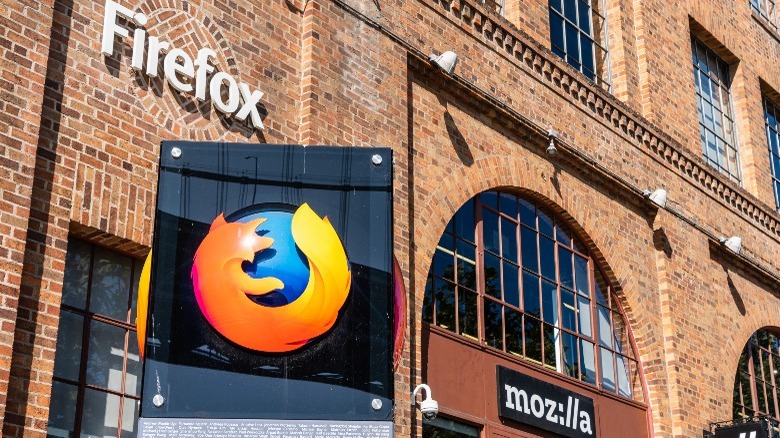Firefox Vs. Google Chrome: Which Is Better?
You may think that a web browser is just a way to access the web, and that it doesn't particularly matter which one you use. While this is partially true, you'll be hard-pressed to find a popular web browser that has severe incompatibilities with web content or just doesn't work on a basic level — there's more to a web browser than opening URLs.
The web browser you choose can have a big impact on your browsing experience, from how webpages look, to how long they take to load — and how hard your computer's hardware has to work to keep up.
According to StatCounter, Google's Chrome web browser is by far the most popular browser, followed closely by Safari, with Microsoft Edge and Firefox coming in third and fourth place. It's unsurprising that Safari and Edge are popular — they are each the default browsers for their respective platforms. Putting popularity by default aside, that leaves Chrome and Firefox as the most popular third-party web browsers, regardless of the vast chasm in popularity between the two — Chrome has a market share of 65.7%, while Firefox only commands 3.14% of the market.
What is Firefox?
Developed and maintained by the Mozilla Corporation, Firefox is an open-source, privacy-focused web browser that was created in 2004. While it's not the fastest or leanest browser out there, it also doesn't aim to be either of those things. According to the Mozilla Foundation, the main goal of Firefox is to provide users with the best browsing experience. As such, Firefox offers a large degree of customization in the form of themes and extensions, allowing users a greater degree of control. Firefox is compatible with Windows, macOS, and Linux, while iOS and Android versions are available. In addition to customization, Firefox features a number of anti-tracking and cookie-blocking options that make it ideal for a less invasive web experience.
The open-source nature of Firefox is a major selling point for Mozilla, theoretically making the browser more secure and more stable than much of the competition, according to DevOps. While Firefox does collect user data, most of it is for development, crash reporting, and stability testing, and most of the data collection can be turned off, and do-not-track settings can be managed on a per-site basis.
What is Google Chrome?
Chrome is a proprietary browser made by Google that uses Chromium — an open-source browser also maintained by Google — as its base. Chrome cannot, however, be released under an open-source license. That's not necessarily a bad thing once you understand why it is the way it is. Chrome builds on its Chromium roots in two key ways. Firstly, Chrome includes proprietary libraries and codecs that cannot be included under an open-source license — namely AVC and MPEG-4. Secondly, Google adds special features to Chrome that are not present in Chromium, such as APIs for Google account login, automatic updates, and data usage tracking and error reporting (via Google).
Chrome is available on Windows, macOS, Linux, iOS, and Android, and offers comprehensive synchronization between the different platforms it's available on. Logging into Chrome with a Google account allows you to share content, such as bookmarks, favorites, passwords, and browser history between platforms.
While Google Chrome does have a privacy mode — called Incognito Mode — it does not obscure your web traffic or make your browsing significantly more secure. Rather, Incognito Mode simply sends do-not-track requests to the websites you visit while it is active, and deletes all cookies and browser history when the browsing session ends.
Resource usage and performance
We've all seen the memes about Chrome being a RAM hog, but does that even matter anymore? According to the September 2022 Steam Hardware and Software Survey, 53.19% of PCs have 16 GB of RAM, while 21.39% have 8 GB — often considered to be the bare minimum amount by PC enthusiasts. While this data is skewed towards PC gamers and enthusiasts — meaning data including basic office computers will probably be different — less than 6% of PCs feature less than 4 GB of RAM, meaning there are very few people that will actually see their computer's performance drop due to their browser choice.
That being said, according to tests done by DeviceTests.com, Firefox only fared slightly better than Chrome in the browser RAM test. If you're looking for a browser on a low-end machine, neither is really going to be a great choice. The story changes when it comes to CPU usage, with Firefox edging out Chrome by about 5% under heavy use, according to BrowserHow. Both Firefox and Chrome also use multi-process architectures, meaning that individual tabs can crash, instead of the whole browser crashing, which improves overall stability significantly, even when hardware limits are pushed. As the results in above tests show, though, it's best to exercise caution with regards to tab-hoarding whether you're using Chrome or Firefox.
Features
While Chrome and Firefox both offer a wealth of extensions and add-ons via the Chrome web store and the Firefox add-on library, even Mozilla admits that Chrome has access to more extensions. Whereas Firefox lags behind Chrome in terms of extensions, it outpaces Chrome in terms of features slightly, featuring a built-in screenshot tool, integrated text-to-speech features, and autoplay blocking. Where Chrome lacks a feature, though, there's oftentimes an extension to get the functionality working on Google's browser.
One key area where Firefox does outpace Chrome in terms of features is anti-tracking and privacy. Firefox also has advanced, configurable anti-tracking and anti-cookie features that Chrome simply doesn't have. Users can choose between standard and strict levels of privacy control, or customize privacy settings on a per-feature basis. The scope of Firefox's privacy settings covers cookies, cross-website tracking, fingerprinting, and crypto mining scripts. The built-in Firefox Monitor compares your email address to a database (haveibeenpwned.com) to keep you updated about whether you have been part of any data breaches.
The key difference is privacy
Ultimately, the "browser wars" are a little bland if you're only looking at features — until you start talking about privacy, security, and corporate policies around data. For starters, Google's business model revolves almost entirely around data and ads, while the Mozilla Foundation is registered as a nonprofit organization. What this means is that Google can use the data it collects about you through Chrome to customize and target ads, which is a privacy concern for many people.
As mentioned before, Firefox does collect some data — mainly usage information, location, and crash reports — but Mozilla allows you to turn off the data collection almost entirely, and even provides you with a guide on how to disable all telemetry. Firefox also allows users to enable private browsing on a permanent basis, and Mozilla claims in its privacy policy that the data Firefox collects is only used to improve the browser's stability, compatibility, and usefulness.
Aside from how the browser itself collects and uses your data, Firefox outpaces Chrome in terms of third-party tracking and cookie management, making it a good choice for users concerned about their online privacy. Where Firefox excels in privacy and customization, it does make some — virtually imperceptible — compromises to speed and resource usage. Chrome's interoperability, stability, and compatibility make it a good browser if you just want something that works well, and offers a wealth of quality-of-life features.





